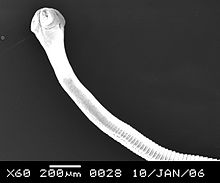Davaineidae
Appearance
| Davaineidae | |
|---|---|

| |
| SEM of Raillietina tetragona | |
| Scientific classification | |
| Domain: | Eukaryota |
| Kingdom: | Animalia |
| Phylum: | Platyhelminthes |
| Class: | Cestoda |
| Order: | Cyclophyllidea |
| Family: | Davaineidae Braun, 1900 |
Davaineidae is the name of a family of tapeworms that includes helminth parasites of vertebrates.[1] Of the 14 genera recorded under this family, Raillietina is the best understood and most extensively studied. Members of the family are characterized by the presence of a crown (rostellum) at the tip of the scolex, and the rostellum is made up of mattock- or hammer-shaped hooks. The rostellum is surrounded by suckers which are armed with spines.[2] These tapeworms are most commonly found in birds, and in few cases, mammals, which are the definitive hosts. Intermediate hosts are small insects such as ants.[3] Hosts of Davainea proglottina (length 1 – 4 mm), for example, are chickens. Slugs are the intermediate hosts.[4]
Genera
[edit]- Calostaurus Sandars, 1957
- Cotugnia Diamare, 1893
- Davainea Blanchard, 1891
- Fernandezia Lopez-Neyra, 1936
- Fuhrmannetta Stiles & Orleman, 1926
- Houttuynia Fuhrmann, 1920
- Idiogenes Krabbe, 1868
- Ophryocotyle Friis, 1870
- Otiditaenia Beddard, 1912
- Paroniella Fuhrmann, 1920
- Paspalia Spasskaya & Spasskii, 1971
- Pseudidiogenes Movsesyan, 1971
- Raillietina Fuhrmann, 1920
- Skrjabinia Fuhrmann, 1920
References
[edit]- ^ Schmidt, G.D. (1982). Cestoda. In: (Parker, S.P.) Synopsis and Classification of Living Organisms, vol. 1. McGraw-Hill, New York, pp. 807-822.
- ^ Jones, A. & Bray, R.A. (1994). Family Davaineidae Braun, 1900. In: (Khalil, L.F., Jones, A. & Bray, R.A., eds) Keys to the Cestode Parasites of Vertebrates. Commonwealth Agriculture Bureaux International, Wallingford, Oxon, UK, pp. 407-441. ISBN 978-0-85198-879-5
- ^ Yamaguti, S. (1959). Systema Helminthum, Volume 2. The Cestodes of Vertebrates. John Wiley & Sons Inc, USA, pp. 207, 401. ISBN 978-0-470-96987-8
- ^ Mehlhorn, Heinz (1998): Grundriß der Parasitenkunde. G. Fischer Stuttgart. ISBN 3-437-25830-3
